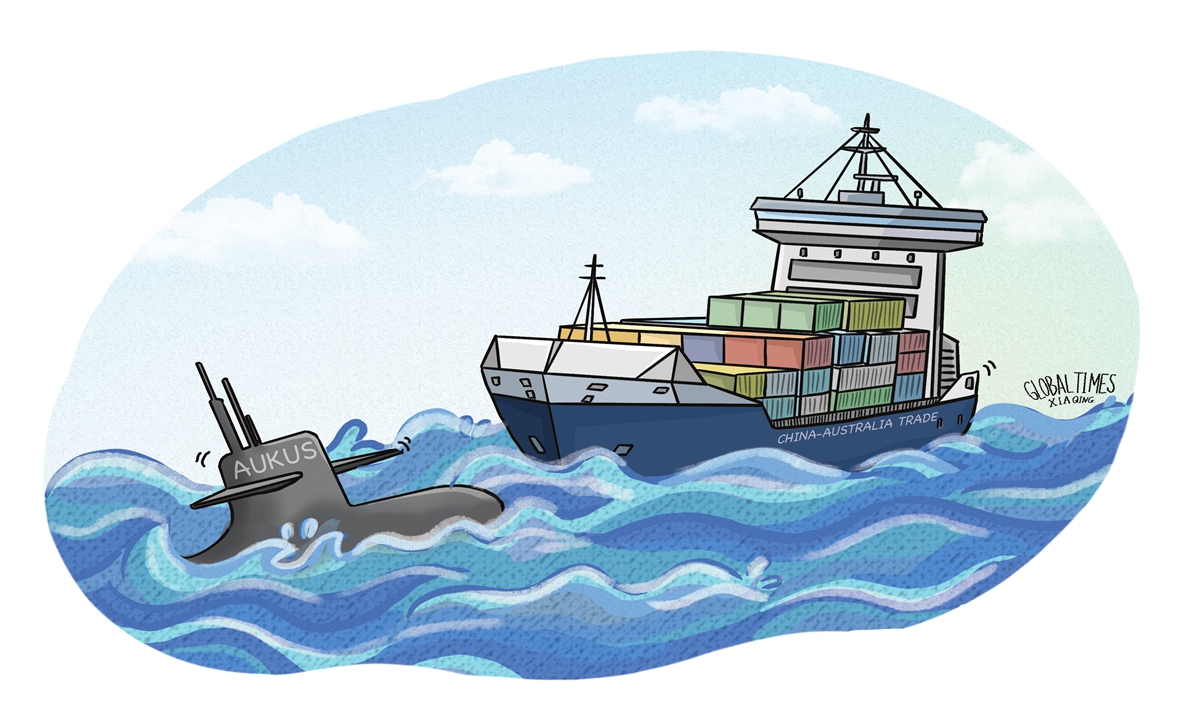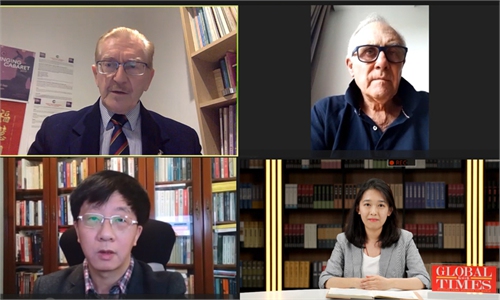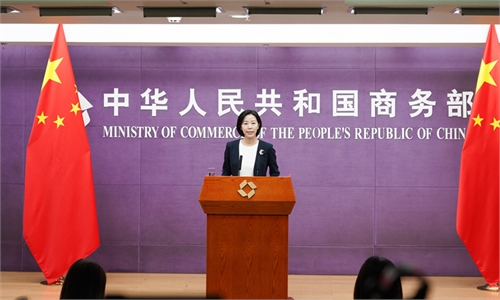Australia risks improving business ties with China by tying itself to Washington’s war machine

Illustration: Xia Qing/Global Times
Chinese investments in Australia have started to rise again in recent months after plunging dramatically from their 2014-16 peak. The pickup in investment has significant potential as some Chinese investors may have forfeited their plans amid the onerous screening of Chinese deals, South China Morning Post reported on Wednesday.Approved Chinese investment deals rose to A$6.7 billion ($4.4 billion) in the last quarter of 2022, up from A$1.7 billion the quarter before, according to Australia's latest foreign investment report. Chinese investors' renewed interest in Australia is an encouraging sign amid the overall recovery in China-Australia economic and trade ties. However, the warming bilateral investments and trade have encountered another challenge - Australia's involvement in the AUKUS nuclear submarine deal.
China's economic and trade cooperation with Australia is a two-way exchange with mutual benefits. China's business interest in Australia, including investment projects, needs to be encouraged by the Australian side as a positive and favorable business environment is conducive to the deepening of a win-win relationship. The current recovery in China's investment in Australia is a hard-won outcome, which should be cherished and further promoted. A constructive and pragmatic approach is essential for both sides to jointly steer the bilateral economic and trade to the normal or even higher levels.
In past years, China's investments and businesses in Australia suffered a number of unwarranted hindrances and even clampdowns. The Australian authorities imposed multiple irrational hurdles on Chinese investment under the guise of "national security," which has in turn adversely affected the confidence of Chinese investors in Australia as a welcoming and supportive destination for business cooperation.
For instance, Canberra in 2018 banned Chinese tech giant Huawei from participating in Australia's 5G network upgrade with the "security concerns." In 2020, the Morrison government unreasonably blocked Chinese dairy giant Mengniu Dairy's acquisition plan of an Australian dairy beverage firm with the same far-fetched excuse. It was such arbitrary or even ridiculous blockade against normal and legitimate Chinese investments that have spooked Chinese investors over recent years. Unbiased policies and corrective measures need to be put in place to forestall such unfair discrimination toward Chinese businesses with investment interest in Australia.
As bilateral trade and investments have shown positive momentum in recovery, it is time for policy-makers in Canberra to drop political biases and offer a level playfield for Chinese businesses. More concrete actions need to be taken to maintain and induce further recovery of the bilateral trade and economic relationship, not the other way around.
Worryingly, however, the treacherous nuclear submarine deal under AUKUS, which would only escalate a noxious arms race and jeopardize regional peace, has imposed an ominous menace on the efforts China and Australia have jointly taken in mending bilateral relations in the past 10 months. Canberra has actively and deeply involved itself in the US-led military scheme which is purported to contain, deter and provoke confrontations with China, which has sounded the alarm bell for Chinese businesspeople who expect a reliable business environment.
It is obviously in Australia's long-term national interest to maintain and strengthen its economic and trade ties with its top trading partner China. However, on the other hand, the Albanese administration shows no reluctance at all to take high-risk moves under the pressure of its alliance the US. Expectedly, it is simply unimaginable for Australia to siphon economic benefits from its economic and trade relations with China while seriously jeopardizing China's strategic core interests at the same time.
Therefore, it is crucial for Australia's decision-makers to have a rational and balanced attitude toward China. If Australia opts to position China as its strategic enemy in line with Washington's anti-China plot, would China acquiesce to let it continue to make huge profits out of the lucrative trade deals to fund such inimical plans like AUKUS that is designed to contain and besiege China? If it keeps moving forward on spearheading the US-led anti-China campaign, Australia's sincerity to mend and improve cooperative relations with China would be seriously questioned. It would be wise for Canberra to find a way to an equilibrium and take fewer high-risk moves, to avoid unwanted consequences for the bilateral relationship.
Since Australia Prime Minister Anthony Albanese took office, with the conjoint efforts made by China, the two sides have effectively reversed the unfortunate decline of bilateral ties during the previous Coalition governments. As the bilateral trade and investments have bottomed out toward a promising recovery, Albanese and his administration need to act in a responsible and forward-looking way, rather than imitating his erratic and reckless predecessor, Scott Morrison.
To continue to repair economic and trade ties with China, Australia needs to take a sanguine view on China, and rationally regard China's development achievements. China should not be imagined as Australia's enemy, but a crucial and helpful partner. China's good faith in mending the bilateral ties should not be squandered, which would in turn damage Australia's own interests.
The US' dangerous geopolitical games are in selfish pursuit of its own interests, often at expense of its allies and partners like Australia. Wise and prudent leaders in Australia need to take a cautious attitude toward treacherous US ploys like AUKUS. To prioritize the US' hegemonic target on top of Australia's agenda is self-hurting, bound to boomerang to impair its own national interest.
The author is the director of the Australian Studies Center at East China Normal University in Shanghai. bizopinion@globaltimes.com.cn



